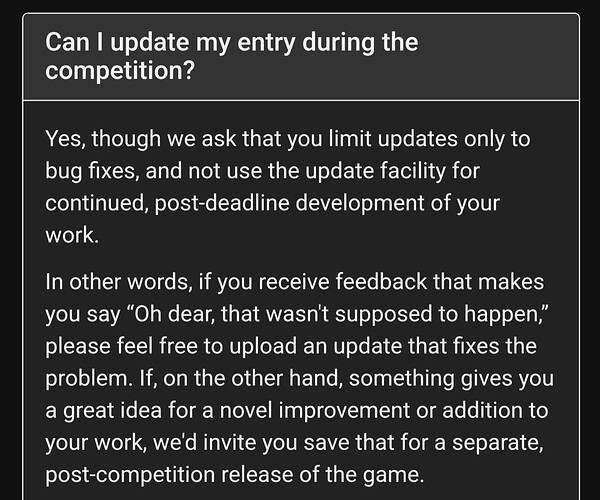There’s some crossover with this topic and this one. I thought I’d talk about what I saw in the authors’ forum, so people know about next year.
There’s discussion about how we got ideas, what our process was, time sinks, other stuff we wrote, and so forth. Which is always nice.
I sent in IFComp ratings the past two years for entries I didn’t test/write, but I didn’t reveal them in the authors’ forum (I looked at the 2021 ratings and had a few “wait, I rated X under Y?” moments.) In fact, it’s been a long time since anyone has. The reviews are more “these parts are neat, these can be fixed for post-comp, I didn’t get this, what about trying this?” So it’s noncompetitive like that.
There were several food reviews to replace Christopher Huang’s reviews people really liked. He’s writing real novels now, and that apparently requires a lot of effort, especially ones that I note are on my local library shelves, as his are.
Often authors get to a quick start reviewing stuff they think meshes well with their tastes. Then we can get slowed a bit, which is okay. We didn’t sign a contract! But then if you do find the motivation to keep going that’s great! It’s hard though. Much like non-authors writing reviews.
Some people start with the short games and work their way to longer ones. A haul of 20 reviews is pretty good. We all wait to post reviews to IFDB until after the comp is over but I think I posted reviews for a couple that I thought deserved a signal boost because they used an unusual engine and people might not try them.
As for looking at reviews I make a point of having a taskscheduler check the forums 2-3 times a day. That helps me with other websites I don’t want to visit too often. I also try to wait 12+ hours before responding to a review so I don’t say anything silly.
Generally people tag it with IFComp-2023 and just start a new topic. They may appear right away, or even 2 or 3 months after. Having something 2 or 3 months after is IMHO a nice reminder to people to check out IFComp entries they meant to get to, so if anyone lets things slide, don’t feel bad. There’s always one person, and people find it interesting! So don’t feel you missed the boat if life gets in the way.
One other thing–a post-comp release is neat to have, or have ready. It’s good for those features that go beyond bug fixes. This’d include, say, new verbs in a parser entry.
It can be tricky to have a branch for both IFComp fixes and post-comp fixes which is another reason to try to keep code fixes simple.
